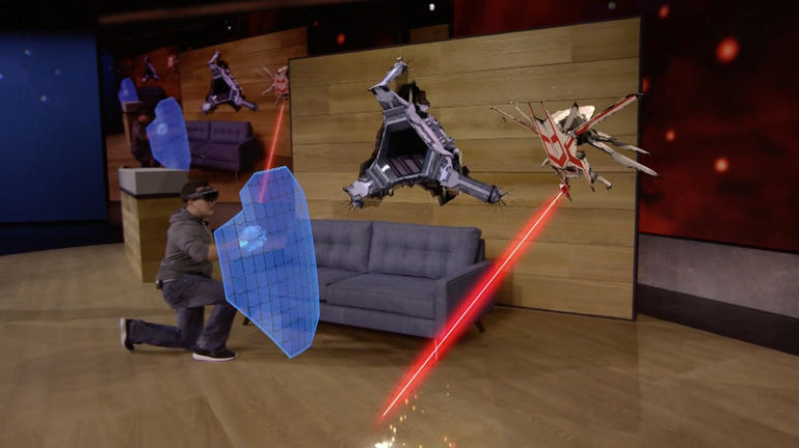
It's pretty clear that Virtual Reality and its related Augmented Reality are poised to bring us into a new technological age. However, is the general public ready for it? There are a few factors that could prevent every user having their own pair of goggles on their head, unless they are addressed.
According to The Verge, Microsoft showed off its HoloLens technology at their big event on October 6th, where they formally announced the Lumia 950 and 950XL, as well as the Surface Pro 4 and Surface Book. The demonstration consisted of a man in a living room stage wearing Microsoft's in-house HoloLens augmented reality glasses.
Augmented Reality allows a user to see computer-generated projections on actual reality. In the demonstration, a man got to wear goggles and a controller on his hand so he could shoot at robots that broke through the wall.
This type of Augmented Reality shows that we might be headed into a new age of technology, one not of just Augmented Reality but Virtual Reality as well. Unlike Augmented Reality, Virtual Reality will cut you off from the sights and sounds of the real world, and there are several products that are due out next year like the Oculus Rift, the HTC Vive, and PlayStation VR. I have reviewed all three recently at PAX Prime 2015.
It is possible that we are entering a VR age, but honestly, we have been through this before. In the early nineties, it was believed that Virtual Reality was going to be the next wave of technology. Unfortunately, the failure of Nintendo's Virtual Boy showed that to be a fallacy. Instead, technology embraced faster Internet along with the mobile phone revolution of smartphones and tablets.
It is possible that the VR age might not catch on, but here are some factors that could make VR a part of our life if addressed now by VR manufacturers:
Education
One of the reasons why every home has a computer is because Generation X was raised with them. Most of us have grown up with computers in our schools, and because of that, we had to get a computer for our home just so we could keep up with the rest of the outside world. It would be wise for VR companies to invest in a massive giving of their products to schools, including primary, secondary, and college. Chances are, the young will see the benefits of VR and want to live in a world where they can't do anything without it.
Equipment Cost
Oculus Rift and founder Palmer Luckey has revealed that the Oculus Rift will cost $350 at launch. That is about the price of a new console gaming system, and VR is pretty game-oriented. Unlike consoles, the issue is that only one person can play on it at a time. This doesn't stop computers from being sold to one individual at a time, but will consumers embrace VR technology at this current cost?
Applications
VR technology is still pretty new, and most of the applications for it are done in-house. There are companies that have games ready for the new platform, and these early-birds will no doubt fuel a new revolution of gaming as well as personal computer interaction. However, unless new applications for VR are formed quickly, consumers will run out of things to do with their VR, and will just go back to devices like smartphones, tablets, and portable computers.
Usage
The issue with Virtual Reality is it really isn't as mobile as a smartphone or tablet. Granted, you will see things in three dimensions with a good pair of VR goggles, but is this something that one would want to wear on a bus? Also, most Virtual Reality demonstrations encourage the user to walk around a room, and some users might not have the space in their own homes required for that.
This would be the biggest issue: Can VR exist in a mobile age? We shall see.







